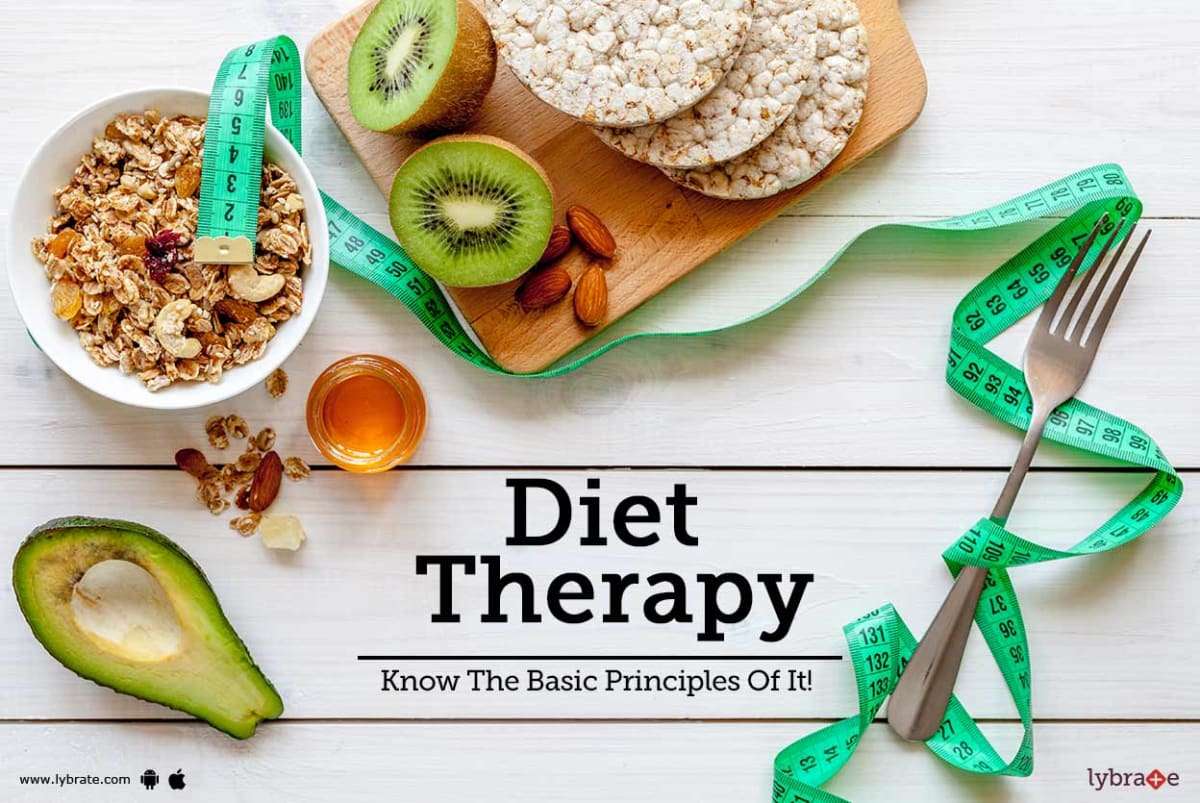Diet Therapy – Know The Basic Principles Of It!
Diet therapy is a strategy for eating the food prescribed by a doctor to improve health and wellbeing. Medications involve including foods that enhance particular health conditions while evading foods that may aggravate the condition. Some health conditions require temporary helpful eating routines. Dietitians regularly detail helpful eating methodologies. The eating routine may change after some time in view of the individual’s reaction and change in well-being status.
The different types of diet therapies are as follows:
- A sans gluten diet is a case of a dietary change that you should keep up to stay solid. Individuals with a gluten narrow-mindedness must maintain a strategic distance from gluten-containing food to divert harm to their digestion tracts.
- The diabetic diet is an extremely basic remedial diet including restricting high-sugar foods to control glucose levels.
- Other remedial weight control diets constrain foods, for example, salt, to control pulse, or soaked fat, to oversee cholesterol. These sorts of weight control plans take some getting used to. Your doctor will work with you to roll out the importance.
Here are some basic principles of diet therapy:
- Side effect Control: When you are experiencing a disease brought on by a horrible eating routine, your specialist may recommend you to consume fewer calories before considering diet therapy, physician endorsed medications or surgery. Certain conditions, for example, heart diseases can be overseen all the more viable when the diet is under control. Your specialist may even recommend you to consume fewer calories treatment essentially on the grounds that he sees you have warnings for heart illness, regardless of the possibility that you are not as of now diagnosed with any.
- Eat fewer carbs Modification: When you enjoy unfortunate dietary patterns, such as picking greasy nourishments, eating an excessive number of sweats or maintaining distance from vegetables, you put yourself at risk for genuine medical issues. After surveying your diet and the risks associated with it, your specialist may propose an adjusted eating routine. It is essential that in case that you get a kind of prescription and routine from your specialist, you finish as you would a professionally prescribed medicine. Changes to your eating regimen can happen in little and straightforward ways yet have a major effect on your health.
- Organ Rest: When you are going to experience a surgery or your specialist is hoping to confine medical issues, you might be requested to abstain from diet therapy to offer a clearer photo of your health challenges or to help the surgery go all the more easily. A few specialists will ask you to go on a liquid diet or delicate eating routine, which can allow weak organs to rest in the digestive system. Therefore, try to eat light foods.
In case you have a concern or query you can always consult an expert & get answers to your questions!
INTRODUCTION TO DIETETICS
DIETETICS
Dietetics is concerned with planning of diets in maintaining health and in prevention and treatment of disease. It is a science as it uses the rudiments of principles of nutrition and it is an art as it is concerned with the aesthetics of food service.
Diet therapy
Diet therapy means use of diet (food and drink) not only in the care of the sick, but also in the prevention of disease and maintenance of health. It is concerned with the use of food as an agent in effecting recovery from illness.
PRINCIPLES OF THERAPEUTIC DIET
A well planned diet providing all the specific nutrients to the body helps to achieve nutritional homeostasis in a normal, healthy individual. However, in disease conditions, the body tissues either do not receive proper nutrients in sufficient amounts or cannot utilize the available nutrients owing to faulty digestion, absorption or transportation of food elements, thus affecting the nutritional homeostasis of the sick person. The diet, therefore needs to be suitably modified. However, it is imperative that the basis for planning such modified diets should be the normal diet.
Therefore diet therapy is concerned with the modification of normal diet to meet the requirements of the sick individual.
The general objectives of diet therapy are
1. To maintain a good nutritional status.
2. To correct nutrient deficiencies which may have occurred due to the disease.
3. To afford rest to the whole body or to the specific organ affected by the disease.
4. To adjust the food intake to the body’s ability to metabolize the nutrients during the disease.
5. To bring about changes in body weight whenever necessary.
The advantages of using normal diet as the basis for therapeutic diets are
1. It emphasises the similarity of psychological and social needs of those who are well, even though there is quantitative and qualitative differences in requirements, thus ensuring better acceptability.
2. Food preparation is simplified when the modified diet is based upon the family pattern and the number of items requiring special preparation is reduced to a minimum.
3. The calculated values for the basic plan are useful in finding out the effects of addition or omission of certain foods. e.g; if vegetables are restricted, vitamin A or Vitamin C deficiency can occur.
Factors to consider in planning therapeutic diets
1. The underlying diseased condition which requires a change in the diet.
2. The possible duration of the disease.
3. The factors in the diet which must be altered to overcome these conditions.
4. The patients tolerance for food by mouth.
In planning meals for a patient his economic status, his food preferences, his occupation and time of meals should also be considered.
The four attributes of a therapeutic diet are;
1. Adequacy
2. Accuracy
3. Economy
4. Palatability
The term “diet therapy” refers to the usage of food and nutrition in controlling symptoms and creating the best possible life for yourself through health and wellness. Some illnesses can be effectively managed by altering your diet, and diet therapy is sometimes used before surgery to ensure that surgery is absolutely necessary. If your doctor has suggested diet therapy as a means for wellness, consider the basic principles of diet therapy so you know what questions to ask and what to expect.
Symptom Control
When you’re suffering from an illness brought on by a poor diet, your doctor may suggest diet therapy before considering medical treatment, prescription drugs or surgery. Certain conditions such as heart disease can be managed more effectively when diet is under control. As the American Heart Association points out, a healthy diet is one of the best ways to reduce heart problems and lead a healthier lifestyle 1. Your doctor may even suggest diet therapy simply because he notices you have precursors or red flags for heart disease, even if you aren’t currently diagnosed.
- When you’re suffering from an illness brought on by a poor diet, your doctor may suggest diet therapy before considering medical treatment, prescription drugs or surgery.
- Your doctor may even suggest diet therapy simply because he notices you have precursors or red flags for heart disease, even if you aren’t currently diagnosed.
Diet Modification
How to Get Your Doctor to Approve Massage for Insurance
Learn More
When you indulge in unhealthy eating habits, like choosing fatty foods, eating too many sweats or avoiding vegetables, you put yourself at risk for serious health problems, notes Sumati R. Mudambi in the book, “Fundamentals of Foods, Nutrition And Diet Therapy.” After assessing your diet and risk, your doctor may suggest a modified diet to help prevent further problems from occurring 2. It’s important that if you receive this type of advice from your doctor, you follow through as you would a prescription medication. Changes to your diet can take place in small and simple ways, yet add up to make a big difference to your health.
- When you indulge in unhealthy eating habits, like choosing fatty foods, eating too many sweats or avoiding vegetables, you put yourself at risk for serious health problems, notes Sumati R. Mudambi in the book, “Fundamentals of Foods, Nutrition And Diet Therapy.”
- After assessing your diet and risk, your doctor may suggest a modified diet to help prevent further problems from occurring 2.
Organ Rest
When you’re about to undergo a surgery or your doctor is looking to isolate health problems, you may be asked to use diet therapy to offer a clearer picture of your health challenges or to help the surgery go more smoothly. Some doctors will instruct you to go on an all-liquid diet or soft diet, which can help give ailing organs a chance to rest in the digestive system. While diet therapy is helpful for gastrointestinal disorders, it can also be used to build up to a normal diet once again.
- When you’re about to undergo a surgery or your doctor is looking to isolate health problems, you may be asked to use diet therapy to offer a clearer picture of your health challenges or to help the surgery go more smoothly.



